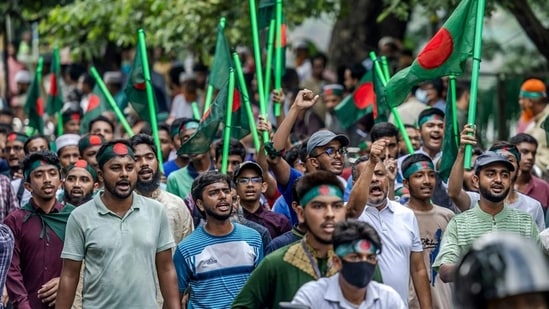The future of Indo-Bangladesh ties
This article is authored by Kamakshi Wason, global COO and director of academic programmes, Tillotoma Foundation.
Bangladesh is facing one of its most turbulent periods. There is chaos in the nation after Prime Minister Sheikh Hasina fled from Bangladesh. This has raised questions on the internal stability of Bangladesh as well as its equations with India.

The current political crisis in Bangladesh is based on a mix of old grievances and new revolts. Sheikh Hasina has faced allegations of corruption and electoral fraud for years. But her resignation has created a power vacuum that is only making the situation worse.
Although the economy has grown a great deal, not all have shared in that growth. Public discontent is high due to rising living costs and weak social services. The repression of opposition parties and leaders has exacerbated the crisis. Among them is Khaleda Zia, the head of Bangladesh Nationalist Party (BNP) who was released recently amidst chaos. However, her release is believed to be an attempt to restore some political normalcy and not provoke the opposition further.
The role of many Islamists groups, particularly the Jamaat-e-Islami, had muddied the waters. The Jamaat-e-Islami, which played a big role in the 1971 war and has traditionally supported the BNP.
Nobel Laureate Muhammad Yunus has promised the restoration of peace and democracy. It's critical that voices like Yunus are calling for calm and dialogue in such turbulent times.
Disturbing reports have emerged about attacks on minority communities as well as Awami League ministers. The assaults underscore the sectarian divisions that have worsened during political turmoil. The recent attacks have left these communities in fear and insecurity. Attacks on politicians highlight entrenched enmities and the fragile state of a crisis that has dragged on for nearly two decades.
What challenges does the crisis in Bangladesh pose for India? As a close neighbor and longstanding ally, the way India handles these tremors will have enormous implications for future bilateral ties.
- Economic relations: The violence has disrupted normal economic activities and paths to the outside world. Indian businesses with investments in Bangladesh are facing uncertainties. Given the level of economic interdependence, any disturbance in Bangladesh can lead to cascade effects in Indian markets across trade and commerce with border states like West Bengal or Assam.
- Security threat: Instability in Bangladesh has been a major cause of security concern for India. It raises worries about a surge in cross-border insurgency and illegal immigration. Security forces in India will have to be on guard for any possible spillover effects.
- Political grounds: It will be essential to engage with emerging leaders and factions in order to secure ongoing stability and collaboration.
- Humanitarian perspective: India should be ready to help people (by providing them necessary aid). India, with its regional power tag carries a certain amount of strategic and moral responsibility to support Bangladesh during these turbulent times. Providing humanitarian assistance, medical care, rations of food and shelter for the homeless will be essential.
- Regional stability: The crisis has wider repercussions on regional stability in South Asia. India is a dominant power in the region and hence the importance of India's intermediary role in finding a peaceful resolution.
This is Bangladesh's moment of reckoning, and possibility for a rebirth. This too is India's opportunity to cement its position as a South Asian stabilising power. The India-Bangladesh relationship is not just bilateral; it is a partnership based on the history, culture, and interests. At this crucial point for Bangladesh, the significance of India will be greater than ever as a neighbour and close friend. Both countries should remember the ties that unite them now more than ever before during this time of crisis and work together.
This article is authored by Kamakshi Wason, global COO and director of academic programmes, Tillotoma Foundation.






